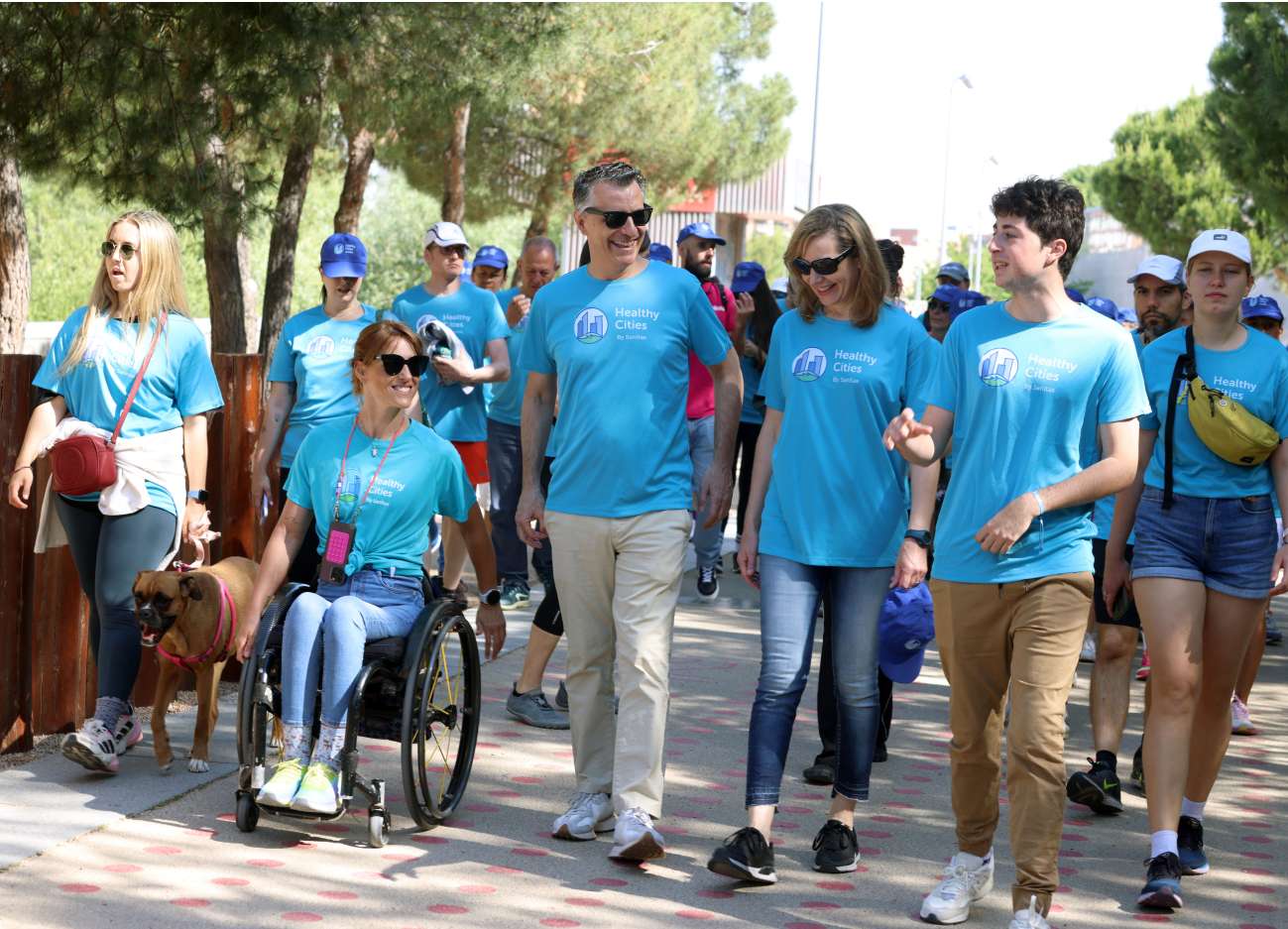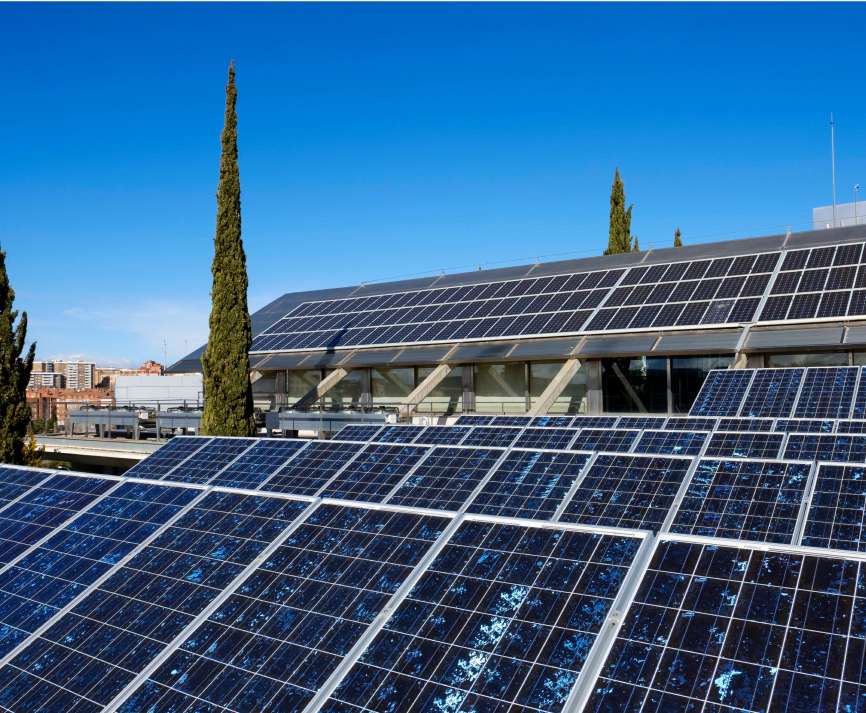Looking after people’s health and the planet’s
One Health
People’s health is closely linked to the health of the environment, natural wealth and biodiversity, air quality, and healthy and sustainable lifestyles. At Sanitas, we are firmly committed to taking action to mitigate the effects of climate change and to the regeneration of green spaces. We are committed to sustainability and global health in order to ensure the well-being of people, both today and in the future.
GRI 203-2, 3-3
We create spaces that protect our health
The concentration of population in cities, with seven out of ten people living in urban areas in Spain, makes it increasingly necessary to transform urban spaces into healthy, more sustainable environments that improve the quality of life of citizens.

The Healthy Cities Challenge
The 8th edition of the Healthy Cities initiative, published in 2023, sets out a dual challenge: to promote healthy lifestyles and to create more sustainable and healthy urban environments. The project invites participants to walk 6,000 steps a day and leave the car at home at least once a week for two months in order to encourage physical exercise and sustainable mobility.

A transformative movement
-
Partners, companies, society and administrations
Healthy Cities was launched in 2015 and is supported by the Spanish Heart Foundation, the Spanish Olympic Committee, the Spanish Paralympic Committee, the Real Madrid Football Club and the Norman Foster Foundation, in addition to the 230 companies and more than 24,400 people who took part in the 2023 edition.
-
Norman Foster Foundation

Sanitas partners with the Norman Foster Foundation to create buildings and urban spaces that improve people’s quality of life and well-being. The joint initiatives include raising public awareness through the Healthy Cities Public Debates, which are sponsored by Sanitas and organised by the Norman Foster Foundation and the promotion and dissemination of the advantages of more sustainable urban environments and their positive impact on health.
-
Sanitas Chair in Health and the Environment
In 2023, the initial findings of the research conducted by the Sanitas Health and Environment Chair at the University of Navarra were presented. A report will be prepared with scientific evidence on the impact of urban factors on the morbidity and mortality rates among the Spanish population and the importance of urban regeneration.
Research shows how factors like air quality, temperature, heat islands, green and blue areas and urban mobility affect health. The aim is to create a situation map to identify problems and situations that have an impact on health, and to explore solutions that will transform cities into healthier places.
-
The Jane Goodall Institute

Since 2022, Sanitas has partnered with the Jane Goodall Institute to raise awareness among future generations. In addition to replanting green spaces, Sanitas supports the Institute’s Roots and Shoots programme, which runs workshops in 100 Spanish schools and teaches around 5,000 students each year about the importance of taking care of the planet’s health in order to take care of people’s health.
We transform cities
GRI 3-3, 413-1
The more than 24,000 trees planted in this edition have been allocated to ten environmental recovery and regeneration projects in different Spanish cities, and, for the second year running, in Senegal.
Urban Forests
Madrid City Council and Bosque Metropolitano
For the third consecutive year, Sanitas has collaborated with the City of Madrid on a project to create a large green belt around the city. In addition to the trees already planted in Ifema, Cañaveral and Butarque, 1,500 trees and shrubs will be planted in the O’Donnell area, at the future junction between Ciudad Lineal and Moratalaz, creating a mixed pine forest and two areas of deciduous forest. A green lung to improve the quality of life for the people of Madrid. In addition to supporting the growth of the Forest, we assume the maintenance and irrigation costs of all our plantations during the first four years through specialized organizations, such as Bosques Sostenibles or Fundación Juan XXIII.
Peri-urban forests
In the Southeast Regional Park (Madrid), which is a bird sanctuary situated along the valleys of the Jarama, Manzanares and Henares rivers, a project is underway to restore 15 hectares of the park in order to accommodate 9,000 native riverside species, including ash, poplar, elm, hawthorn, rose and tamarisk trees.
Planet’s largest lungs
Sanitas continues to work with the Jane Godall Institute in Senegal, planting trees to fight climate change and desertification in the Kédougou region of Senegal, a sanctuary for endangered chimpanzees and one of the planet’s largest lungs.
Healthy Cities figures 2023
8
+24,400
230
+6,300 M
36
+24,000
238,000
At Sanitas, we are committed to caring for people's health, and if we mean to do so, we have to take care of the environment around us. So, we have set ourselves the goal of becoming a net zero company a decade ahead of the Paris Agreement, and thanks to the efforts of the entire organisation, we are well on the way to achieving it.

Yolanda Erburu
Directora de Comunicación, RSC de Sanitas y Bupa Europa y Latinoamérica, y directora de Fundación Sanitas
Net-zero target
GRI 302-4
Sanitas started a decarbonisation process several years ago, with the objective of reducing emissions from its operations. This strategy is aimed at reducing carbon and other greenhouse gas emissions. The goal is to become a net-zero emissions company by 2040 and to contribute to the containment of global temperature rise to below 1.5°C.

Our progress in decarbonisation
GRI 3-3
Sanitas has achieved a reduction of nearly 78% in carbon emissions compared to 2009, thanks to the implementation of energy efficiency and renewable energy projects that minimise the impact of our facilities on the environment.
*Emissions from burning natural gas, LPG and diesel, electricity and from our own fleet
Climate-resilient buildings
Innovation for low-emission healthcare
GRI 302-4
Innovation in healthcare is also critical to reducing emissions and achieving a sustainable future. Sanitas uses advanced technologies and implements environmentally friendly health care practices.
Sanitas makes sustainable anaesthesia a reality
Digital transformation
Eco-Disruptive
Water footprint
GRI 3-3, 303-1, 303-5
Water is an increasingly valuable and scarce commodity. At Sanitas, we are equipping all clinics with taps featuring automatic sensors and atomising filters. This will reduce the water footprint through more efficient and responsible consumption.
Circular economy
GRI 3-3, 306-3
The three fundamental principles of a circular economy are reduction, reuse and recycling. At Sanitas, we adhere to these principles through responsible consumption of resources and effective waste treatment procedures.